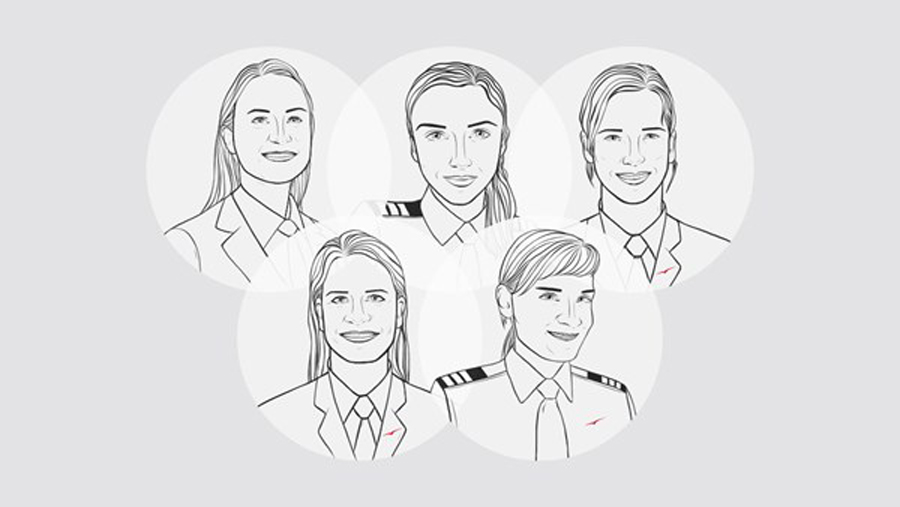
A woman in charge of a flight is nothing new, however, industry statistics have shown that on average only 5% of pilots are female and only 1.42% of those are Captains*.
At VistaJet, our colleagues are our greatest asset. 40% of them are female and each one has made this company unique. That said for those on the line, we are striving to do better, further push the industry, and inspire the next generation of female pilots.
If you’re qualified, you’re qualified.
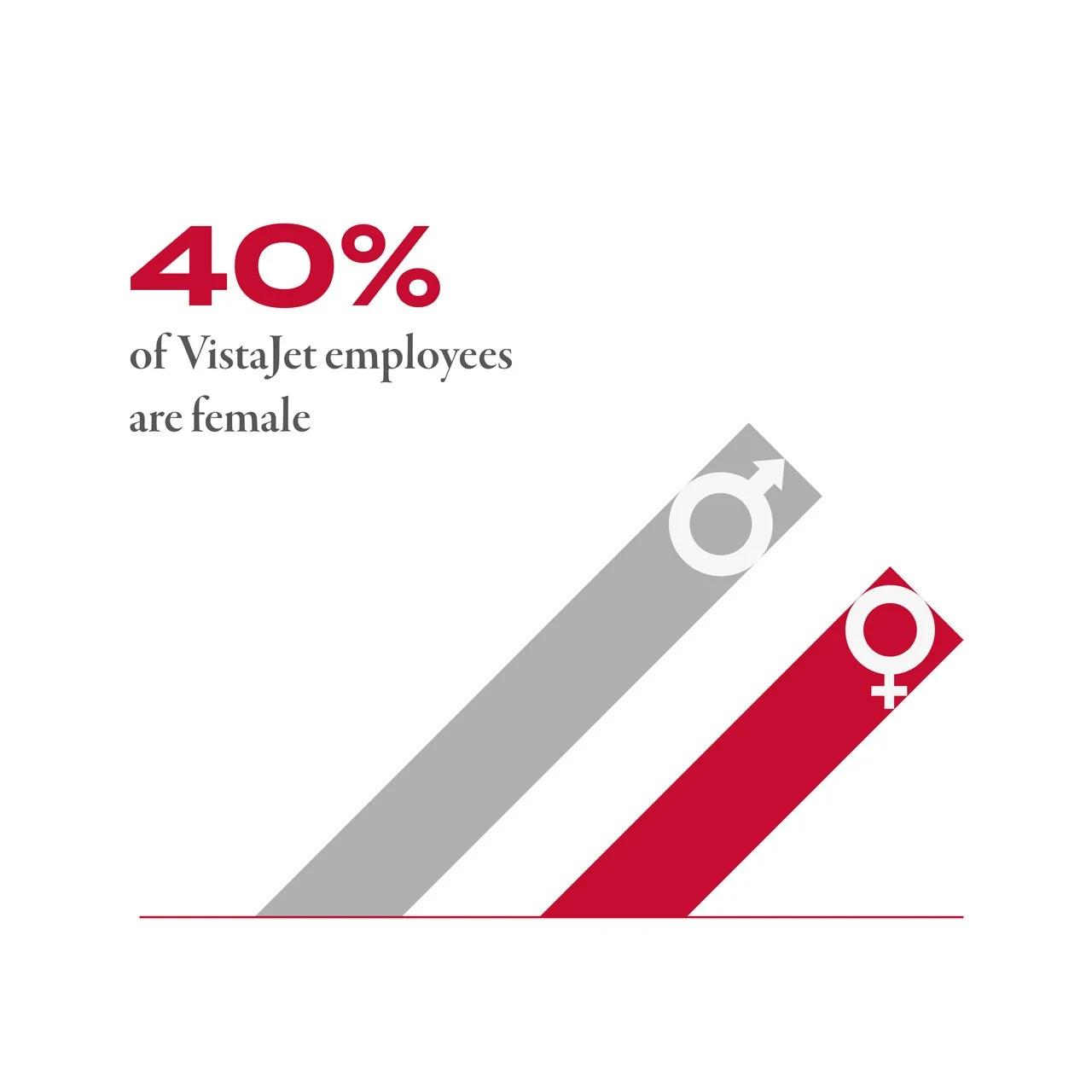
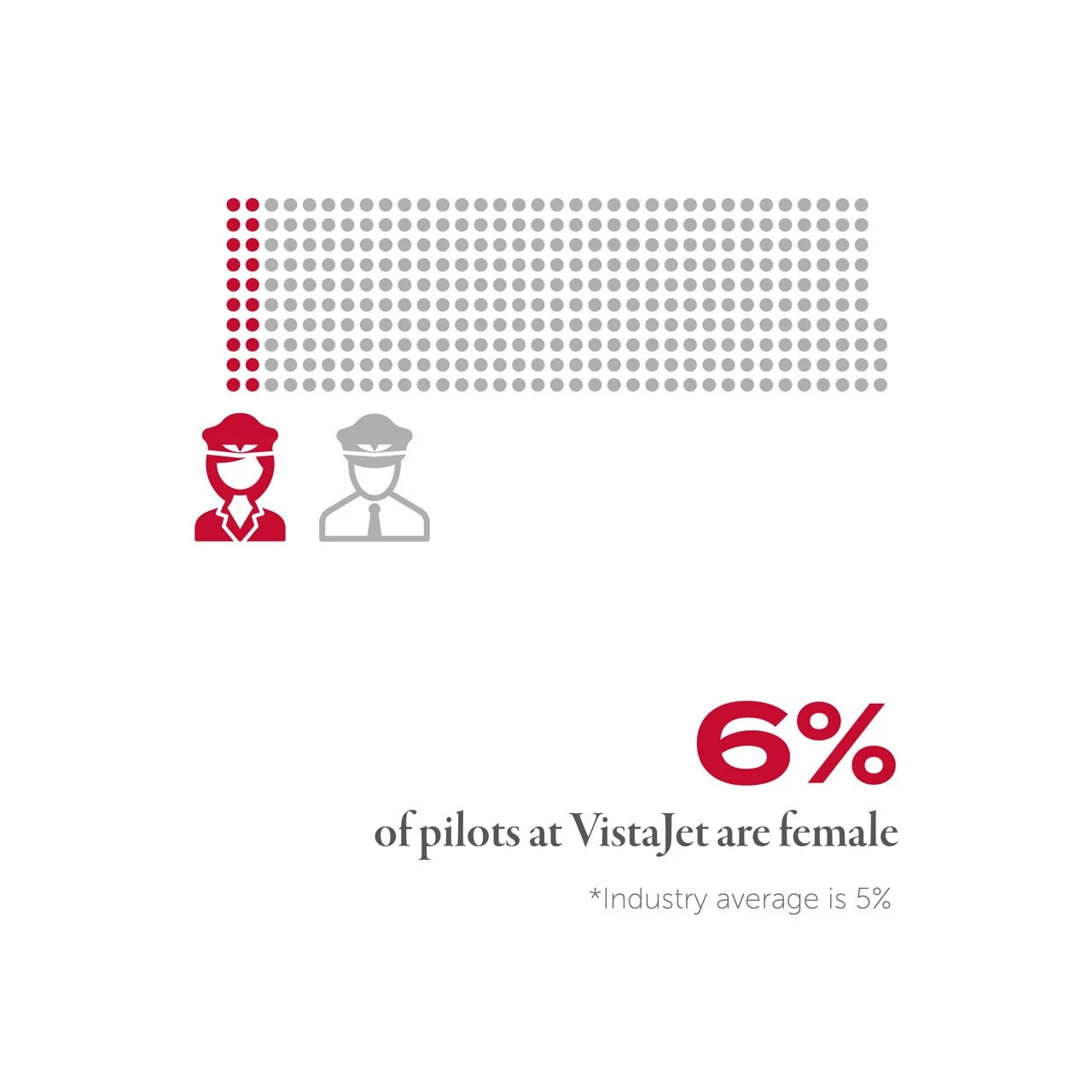
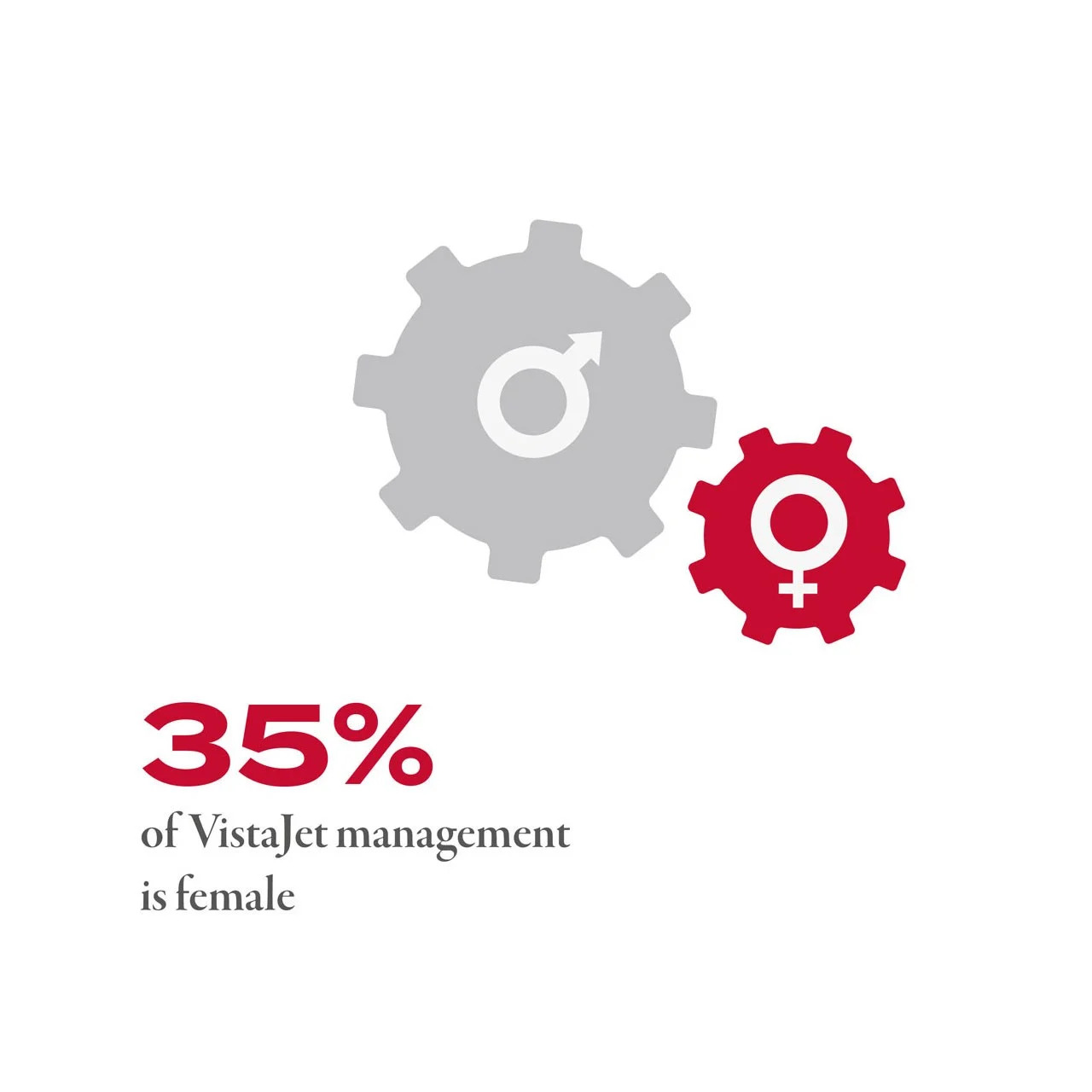
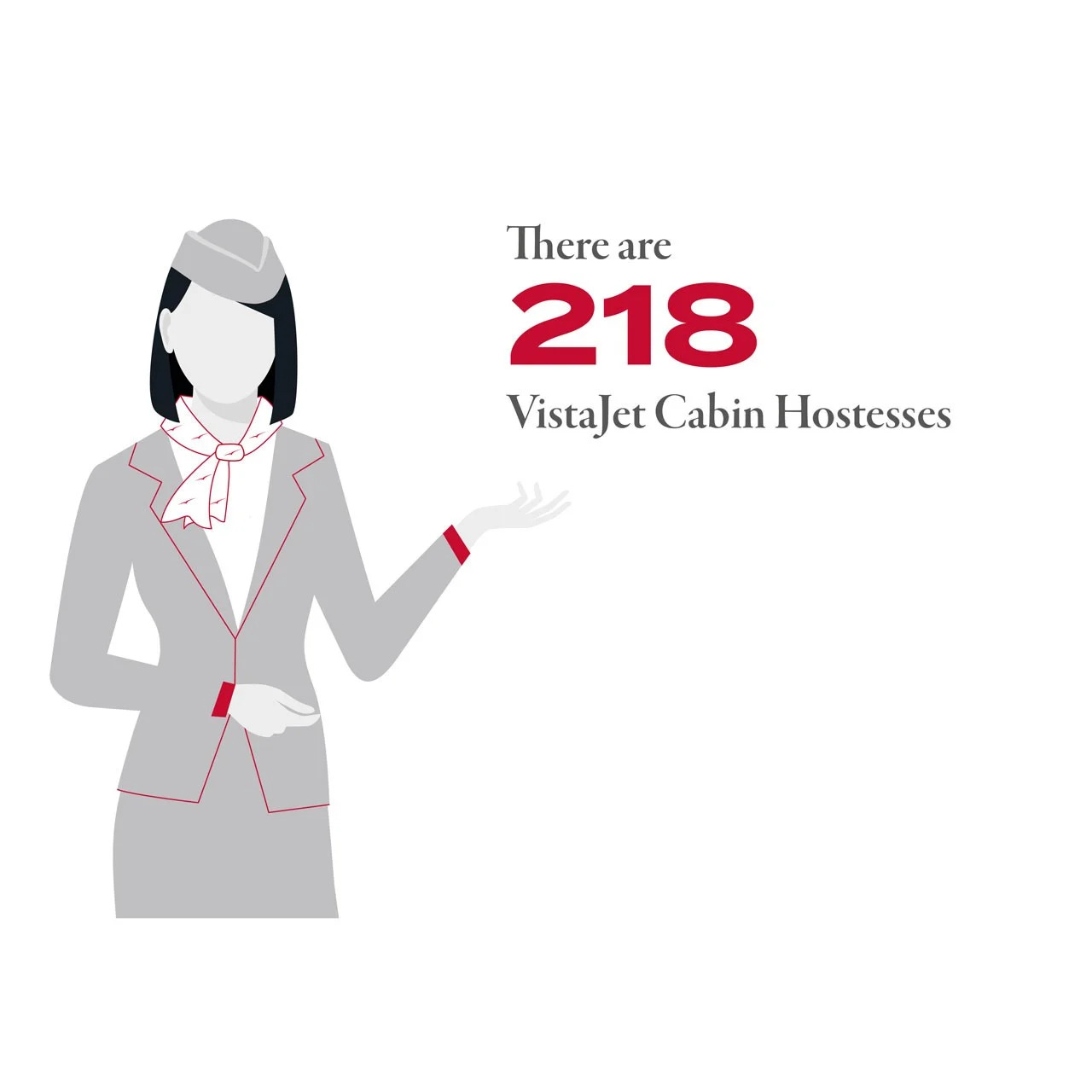
Today we speak with five amazing VistaJet pilots and find out how they have thrived in a mostly male-dominated industry.
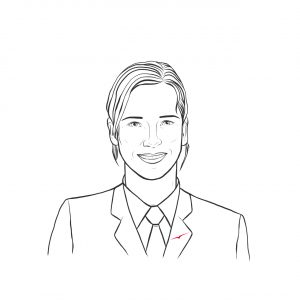
Captain, Challenger 605
Line Training Captain and Type Rating Instructor
What got you into aviation?
Passion. That’s the word, isn’t it? To be a pilot, you have to have passion.
I also grew up in a flying family — my father was a pilot. He flew fighters and later in the 70s, he flew rescue helicopters. I remember when I was little, we used to take the Sea King and go heli-skiing — defense budgets were quite generous back then — so we always used to get taken on these incredible trips. I think after that, I knew there wasn’t another option for me, I wanted to fly.
How did you start your career in aviation?
I went to flight school in Northern Norway, just a couple hours’ drive from Tromsø. At the same time, I would fly quite a bit from Tromsø on a propeller plane, doing short hops for people wanting to see the Northern Lights and the Midnight Sun. After that I worked for a Norwegian company doing ambulance and VIP flights.
A few years later, my whole family moved to Malaysia because my husband got stationed there — at this point I wasn’t flying and was a full-time mom. It was while we were in Malaysia in 2008, that I read an article about VistaJet investing in the market. That’s when I thought, “Wow, this is my way back into aviation”. I contacted VistaJet and it went from there.
You’ve been flying for a while now, have things changed in the aviation industry? Have perceptions of female pilots shifted?
When you imagine a pilot, you imagine a man. That’s because a pilot isn’t someone who looks like me.
I had an instance in Japan — we had just landed and I had asked the handler for the flight documents. The handler responded with “I will give it to the Captain”, looking at the First Officer who of course looked a lot more like a Captain in their eyes, because he was male. Another time, a passenger handed me their coat thinking that I was the Cabin Hostess — which I didn’t mind of course — but when I introduced myself “Hi, I’m Elin. I’m your Captain”, they were surprised.
I never get insulted by these interactions though. Maybe when I was a brand-new Captain and wanted to show that I was running things, but now I’ve come to an understanding that it really doesn’t matter — so I don’t let it bother me.
We know it doesn’t happen often, but have you had the chance to fly with an all-female crew?
I have a few times and it’s the most amazing thing! There is something truly special about it.
I remember the first time I had an all-female team, it was on the Challenger 605. We were flying from the Maldives to Singapore, we had six passengers all female — so there were nine of us in total and we were all women. It was the first time we had an all-female team on the 605. We all cheered when we landed and it was an unforgettable flight.
Do you think there is enough encouragement for women to become pilots?
I do think that airlines and also flying schools are working to encourage more women into aviation. In flying schools, you see more and more pictures of female pilots being represented on posters, so there is work being done, but there is still a long way to go.
I also think that female pilots need to lift up other female pilots — we need to be mentors for one another. I’m coming to an age and experience where I’m mentoring more and sharing my knowledge so that I can encourage other female pilots to climb up the ladder of success.
I also want to show that it is possible for women to combine family life and flying. A lot of women stop before they reached their four stripes because they think it will be difficult to manage work and home life. People say to me all the time “I don’t know how you do it?”. Of course, it’s hard to leave your children, but for me, I know that when I’m home, I’m really home with them. Other families who work nine to six don’t have this.
What words of advice would you give to women who want to become pilots?
That there is no difference in our ability. There’s nothing that makes a woman less capable or less qualified for this job. You don’t need big muscles to fly, you just need two hands and a head.
If you’re qualified, you’re qualified.
What has flying been like in the COVID-19 era?
As pilots our mentality is to just get on with it, but things have definitely changed. We now have one crew, that’s your family for the duration of your rotation. They are the only people you can mingle with. We also spend a lot more time confined in our hotel room, which can feel a bit lonely at times.
I’ve been running a boot camp three times a week for the last year over Zoom to keep me motivated and help me stay in touch with friends and family from around the world. We now have around 16 people training together — pilot friends from now and before, Cabin Hostesses, old friends from Malaysia, Denmark.
Despite this, I want to add that VistaJet has done an amazing job of looking after its people during the pandemic. I meet other pilots in the FBOs and they ask us “How’s VistaJet doing?” and I always proudly say, “You know what? We haven’t let go of a single person”. It’s amazing to be able to say this and it makes me proud to be a part of the VistaJet team.
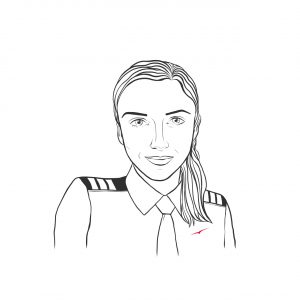
First Officer, Global 6000
What got you into aviation?
It came out of the blue pretty much, because of a summer job I found at Nice airport. I was working at the airport as a handling agent, checking in passengers etc., I did this for two summers and I grew to really like the atmosphere and talking and interacting with international travelers.
As I was 18 at the time and didn’t want to rush into getting a job, I went back to school to study. I studied aviation between France and the United States. On the side of my studies I started flying and working toward my Private Pilot License. This license didn’t allow me to fly commercial, but I could fly my friends and family for fun.
I think my dad’s secret ambition to become a pilot also encouraged me to fly, he couldn’t fulfill his dream as he was colorblind, but he was always there pushing me in the background. Once I eventually got my bachelor’s degree in Aviation Science, I went on to get my commercial licenses.
How did you start your career in aviation?
When I graduated in 2013, it was really difficult to find a job, but I got really lucky because I found a job on the ground in Paris-Le Bourget. While I was there, I actually handled a few VistaJet aircraft and it became a big dream of mine to join the company.
After my job at Paris-Le Bourget, I joined GlobeAir, where I flew on a Citation Mustang. I spent six years with them, before I finally got my opportunity to join VistaJet. I applied to fly on the Global and I luckily got my dream job. I’ve been loving it ever since.
You mentioned the Citation Mustang, an aircraft which does shorter hops than what you are now used to on the Global. How are you finding the longer ranges?
It was a big step in my career, but flying with GlobeAir was a very good school in a way because despite the short hops, it taught me how to deal with changes in the air. I guess with VistaJet it’s the same type of operation — the routes might change, we might end up landing at a new airport — but now it’s just on long-haul flights.
I also know that the Global is such a safe and efficient long range private jet, that I actually feel very comfortable flying it around the world. Obviously on the Global the avionics are a bit more complicated, but you are well trained at VistaJet, so flying the aircraft is very easy for me.
You work on a 17 days on 13 days off roster — like all crew at VistaJet — how do you balance work and home life?
It can be hard at times, but sometimes you can have some really amazing moments where your work and home life intertwine. My partner also works for VistaJet and we’ve never met on rotation before, but I recently met him and my brother in New York at once, plus friends and family all in one rotation. Pretty incredible.
Outside of work, I know that once I get home, I really am home. I have a personal life and a family, so it’s important to use the 13 days outside of work to recharge my batteries, so that I am fresh for my next rotation.
In your career so far, have you ever flown with an all-female crew?
At VistaJet, we have one female Global captain — Monique — so it’s a rare occasion when we can fly together. I did however get to fly with Monique once with an all-female crew and honestly it was amazing. We were flying to Saudi Arabia and I remember when we landed, the handler came up to me and asked “Where’s the Captain?”. I replied that “she is up the stairs”, he looked up waiting to see a man, but when he saw Monique, he was a bit lost. I guess it isn’t common to see an all-female crew. It was quite funny really.
In my experience flying with a female pilot is so much more different than flying with a male pilot. Technically speaking, it’s the same because we have the same experience, qualifications and licenses, but the dynamic within the cockpit and with the Cabin Hostess is very different. I would not say it is better, but it is different and something I really enjoy.
You mentioned the handling agent asking where the male pilot was, have you come across any difficulties or prejudice as a female pilot?
Aviation is a highly male profession, so it doesn’t surprise me when a misunderstanding like a handler expecting a male pilot happens. I also know that the aviation industry has very high standards and is a safe environment for any female — it would not tolerate gender differences.
At VistaJet the team is very young and young people are generally quite open minded, so the gender difference is not really felt. Most of my colleagues have been very supportive, as have passengers actually. There are some times, when people are surprised to see a female pilot, but I’ve never seen a passenger refusing a flight because they saw me.
What advice would you give to young women looking to get into aviation?
I would say, to always accept an opportunity and always be open-minded to changes. I have personally always wanted to work in private aviation and I’ve been very lucky to find a job in this industry. I know it can be difficult at times, but it can also be very rewarding, especially when you find the company that you really want to fly for.
Also stay motivated and ambitious, it will pay off in the end and get you to where you want to go.
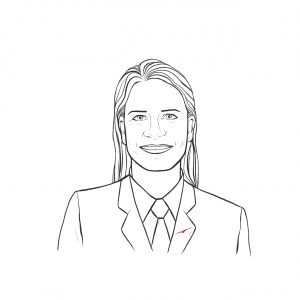
First Officer, Global 6000
What inspired you to become a pilot?
I didn’t know anyone in aviation. A lot of the pilots around me today had a father or an uncle in aviation who guided them and helped them on their path. My inspiration simply came from a holiday I went on when I was younger. I saw all these beautiful flight attendants and thought one day I want to be a flight attendant. But then I went to high school and I thought maybe I want to do something else. That’s when I started thinking about becoming a pilot.
How did you start your career in aviation?
When I was 18, I started flying in America. I studied in a school in Florida with 75 guys and a handful of girls. Flying was always my dream and learning to fly in America was an amazing experience.
After America, I came back to Europe and worked on getting my European licenses. I managed to get a job straight after as a flight instructor at Egnatia Aviation, followed by a flight instructor job in Kavala, Greece. At the time, I was still young — 20 — so it was challenging being female and teaching in such a macho culture. Standing in front of a class full of guys, who thought they knew better, taught me a lot and it made me have to prove myself even more.
After a year, I left Kavala and tried to find a job as a pilot. I sent my CV everywhere, but I didn’t get any replies because my experience was on small airplanes, so, I tried my luck applying for Flight Attendant jobs. Funnily enough I even applied at VistaJet, but ended up getting a job at Etihad. My focus was always to stay in aviation and find my way back to being a pilot.
I worked at Etihad for a year and a half, then managed to get a connection at Susi Air and started flying there as a pilot. It was a completely different environment though, to go from being surrounded by mainly women, to going in to the middle of the jungle with only guys around. At 22 I was the youngest out of the whole group, so again, I had to work hard to be taken seriously.
My determination paid off though and I was able to land my dream job flying private jets at VistaJet in 2015. Despite all my experience, I would say VistaJet is the first proper company I have worked for.
You mentioned constantly having to prove yourself in your career. Do you feel like you still need to do this or have things changed?
I don’t think I realize it anymore, but I guess I am still having to prove myself in some way or another when I’m working. For example, most days I’m addressed as the flight attendant, anywhere I go, anywhere I walk, they don’t think I’m the pilot. I obviously don’t take offense to this — it’s just a common assumption that pilots are men.
In my previous job, there were quite a few occasions that passengers would come up to me, and ask me how old I was, how long I’ve been flying the airplane and generally questioning my ability — I’ve never seen this happen to any of my male colleagues. You can get a bit tired of hearing this, but I love flying so I didn’t let it bother me.
You’ve worked with a lot of men in your career, have you ever experienced an all-female crew?
I have, I actually flew quite often with a pilot from Germany, which was awesome. I’ve also flown with Monique, our Global female Captain. It’s nice when you have an all-female crew — generally it’s just nice to have a change in dynamic. I’m so used to flying with guys, that when another female pilot is around, it feels special.
What has it been like to be a VistaJet pilot?
It’s been an adventure, but overall, it’s been great. I’ve had the chance to fly three years on the Global and I had three years on the Challenger 350 before that. The Global is definitely a different flight, and requires a different kind of life. I’ve literally been exploring the world on the Global and its made the world seem so small. The 350 was fun as well, but you’re limited on the destinations. Overall I feel very lucky and fortunate to work at VistaJet.
What has been the most incredible flight you’ve done within the last year?
I’ve been flying to Alaska a lot and I absolutely love it. Alaska is very special to me because I love nature and it has some of the most rough and beautiful terrain in the world. With COVID everything has gotten a lot more stressful, so to be able to just hike, go on road trips and explore the country, has helped me a lot — it kind of feels like things are normal again.
What advice would you give to young women looking to get into aviation?
Be confident in your abilities. There will be moments when things don’t go right, but you have to stand up for yourself and show that you know what you’re doing. Those moments only account for one percent though, 99% of the time things will be perfect.
Also, never give up. I would never have reached my goals if I didn’t do all the jobs I did and face all the obstacles I faced along the way. If you work hard and do anything and everything, especially in the beginning, you’ll get to where you want to be.
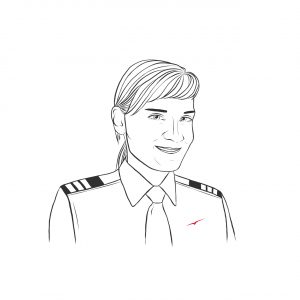
First Officer, Challenger 605
What inspired you to become a pilot?
My father started flying as a commercial pilot the year I was born, so I’ve seen from an early age what it was like to be a pilot. I used to find it fascinating that he would travel so much and get to explore so much of the world. I loved it even more, that he had off days when everybody else was working — it meant I got to spend quality time with him. Seeing him and the lifestyle he had, was a great motivation and inspiration for me.
Your career at VistaJet started off slightly different to our other pilots, can you tell us a bit about that?
Sure. I actually heard about VistaJet from a friend who worked in Operations. He told me there was a position available in the department and because I was aiming to become a pilot, I thought it would be a great way to enter the industry. So, I applied for the Operations job and a few months later I was lucky enough to pack my bags and move to Malta.
I spent four years in the office, one year in Operations and three years in Dispatch, before I finally got the chance to join the Flight Deck. Having that knowledge of how all the different departments work together and how VistaJet flights work on a day- to-day basis, was super helpful in my transition to joining the crew. It allowed me to see things from a different perspective and made my experience more enjoyable.
Has there been a particular flight that has stood out to you since you started flying?
I don’t know that I could highlight a single flight, I really enjoy aviation, so it’s all been incredible. What stands out me is overcoming challenges and knowing that at the end of the day I can work with my team (both in the cockpit and outside of it) to find solutions and fix problems. It’s amazing how many different cultures and mentalities work together. It’s definitely the people that makes VistaJet.
Since joining the flight crew, have you experienced any difficulties or prejudice as a female pilot?
From the company and from my colleagues, I’ve been lucky enough that I’ve never been treated any differently and I really appreciate that — I was always accepted and welcomed. Sometimes passengers will notice that there was a female pilot, but I’ve never received any negative comments. More often than not, it’s something interesting for them, something special to see.
You’ve been in the aviation industry a while now, have you seen more women taking up roles in the industry?
Yes, absolutely. It’s becoming more common that women are choosing careers in aviation. And while I love the fact that more women are joining the industry, I also respect the fact that males are still dominating. To me it is completely fine that there are jobs out there which are led mainly by men or by women. The important thing here, is the freedom of choice.
I was lucky that I had the opportunity and the choice to become a pilot. There are many girls out there in the world who do not have the basic rights to get an education and that needs to change. Ideally, I would like everyone to have the same opportunities I had, to get the career they desire.
You recently became a new mother and are currently on maternity leave. Do you anticipate any difficulties when coming back to work?
I don’t have an official start date yet, but I’m lucky that because I live in Austria I can decide how long my maternity leave will be. To me, it’s all about finding a good work life balance. There are so many mothers in the company, not only female pilots, but lots from the Cabin Crew and their schedules are very similar to the pilots. Seeing and talking to them shows me that despite our unusual schedules we can all be loving and caring mothers to our children. So, while it will be daunting at first leaving my child to go on rotation, I think it will be ok.
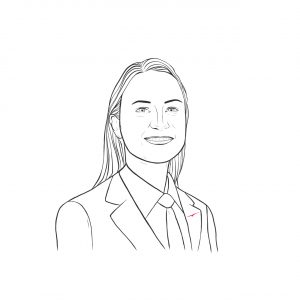
Captain, Challenger 605
What inspired you to become a pilot?
It was around 23, that I got my eye for flying through a friend who flew to skydive. I instantly got really attached to flying and thought it was a lot of fun. I started looking into getting my pilots license, so I could fly as a hobby, but the more I researched it and the more I flew with my friend, the more I considered flying as a full-time job. From that moment on, I started to seriously look into becoming a commercial pilot.
How did you start your career in aviation and how did you get to VistaJet?
I finished flight school at 25 and my dream was to start flying on a smaller aircraft, so I could work my way up from a single engine to a jet — this was so that I could experience different types of flying. The job market was tough when I left school though, so it was hard to find a job at first.
I ended up landing my first flying job at Susi Air in Indonesia, flying a Cessna Caravan. It was the best first job and the perfect introduction to my flying career. I spent two years flying for Susi Air, traveling all over Indonesia, from up north in Sumatra down to Papua and in the mountains towards Australia.
While I really enjoyed it at Susi Air, I missed home, so I kept my eyes open for any opportunities in Europe. I got lucky and joined a private jet/ambulance operator in Stockholm (my home town) flying a Learjet 45 — it was quite a transition, but the flying was fantastic. I very quickly realized that I enjoyed flying to different places and airports — not just the same route A to B — I wanted to stay in this type of operation for longer.
I had a lot of friends in aviation and at the time they were all talking about VistaJet, so that made me also look for an opportunity there. When I got the job at VistaJet I was so excited. I left the company in Stockholm with two years of great experience. I was so happy to be able to continue with the private jet operation and have the opportunity to move onto an even bigger jet.
What has it been like to be a VistaJet pilot?
I started straight on the Challenger 605 as a First Officer and I’ve really been enjoying it. I feel lucky that I joined on the 605 because I don’t just fly in Europe and I still get to go to Africa and the Middle East. I might not go across the pond to the US, but I don’t miss that too much. I have the perfect balanced lifestyle on rotation, thanks to the great variation of flying on the 605.
Has there been a particular highlight in your career at VistaJet? Or a moment that stood out to you?
I had been at VistaJet for just over a year and we had a flight down from South Africa to Zimbabwe. On our way to landing at Victoria Falls airport in Zimbabwe, we actually got approval to circle above the Falls themselves. It was amazing, we were coming in on our high-performance jet and just circling over Victoria Falls. Seeing it from above was absolutely stunning. The passengers were also just as pleased and excited, as they had never experienced anything like that before.
It’s definitely a moment that stands out for me.
Aviation is still quite a male dominated role. Have you experienced any challenges or differences being a female pilot?
I must say, among my colleagues, I don’t find I am treated any differently, they always treat me very well. Sometimes you get reactions from passengers, but usually a positive one. They just, sometimes don’t realize I am the Captain until I’m actually about to go into the cockpit. I would have already introduced myself, picked them up from FBO, taken them to the aircraft and done the briefing, but its only when I go to take my seat, that they realise who I am. It’s weird that it happens, but I think it’s partly because I’m female and partly because I’m younger. I’m not what they are expecting.
I do feel that as a female pilot you sometimes have to prove yourself more, especially when it comes to the technical parts. People just assume that you don’t have the same knowledge, so you have to make an extra effort to show that you can.
What advice would you give to young women looking to get into aviation?
Stay driven and motivated. Flight school can be quite tough, I remember when we did ATPL (Airline Transport Pilot License Theory), we had tests every Friday, and if you failed, you’d have to re-sit the same test on Monday. Plus, you would still have to prepare and study for a new test on Friday. If you weren’t on top of things, it was so easy to fall behind. That being said, if you work hard and remember the end goal, the rewards are well worth it.
I would also say to be involved in aviation, find a side job in the industry or something where you can start to build connections. These will pay off later down the line when you are looking for a job.